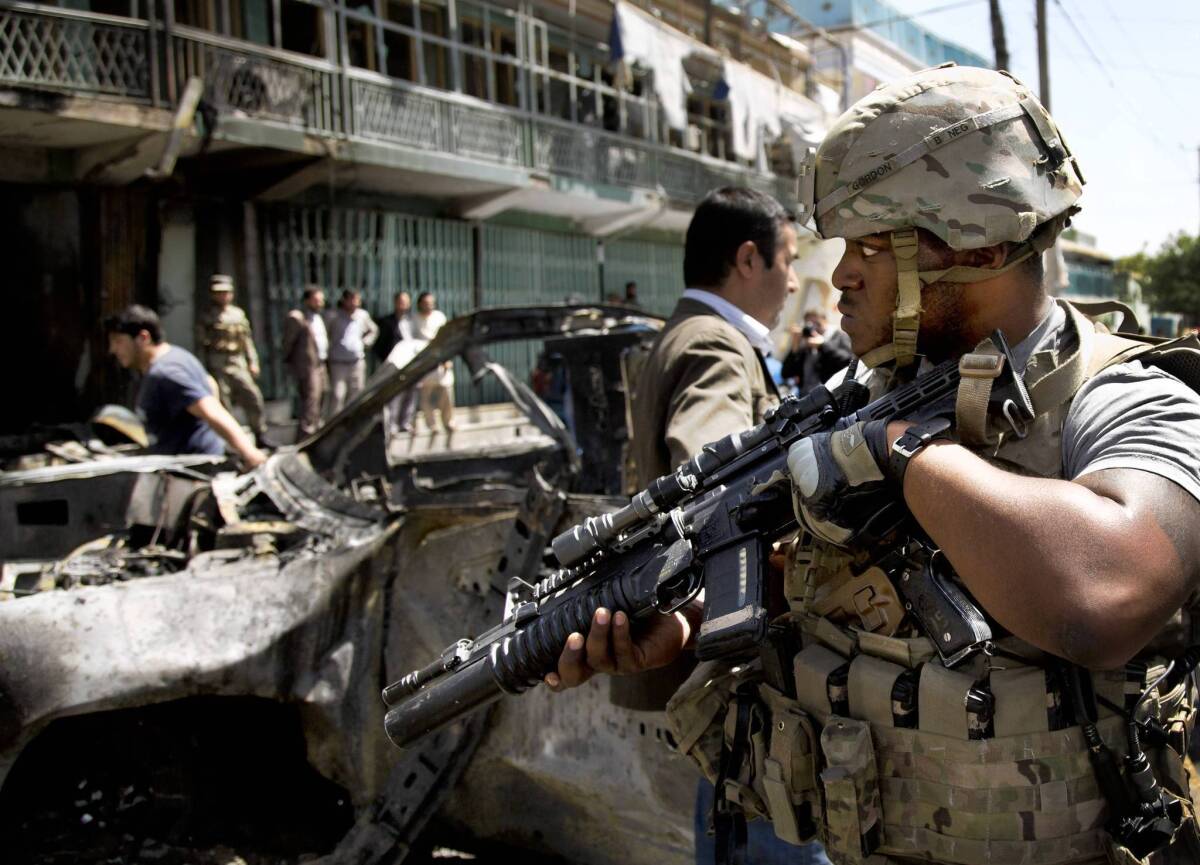Afghan militants threaten more attacks after deadly bombing

- Share via
KABUL, Afghanistan — A militant group said its attack Thursday on a NATO convoy in the Afghan capital marked a stepped-up campaign against the foreign presence in Afghanistan, and promised more such assaults. The suicide bombing killed six Americans, including four civilian contractors, and at least nine Afghan civilians, including two children, according to local and coalition officials.
“Our party will increase its attacks against foreign troops in Afghanistan in the future,” said Zubair Sediqqi, a spokesman for Hezb-i-Islami, which claimed responsibility for the attack. He spoke by phone from Pakistan. It was the first major attack in Kabul since insurgents launched their spring offensive last month.
Authorities said the suicide bomber was driving a Toyota Corolla when he pulled up beside a North Atlantic Treaty Organization convoy in a residential neighborhood and detonated powerful explosives. The blast, which was heard across Kabul, sent a large cloud of white smoke into the air about 8 a.m., as people were commuting to work.
Mohammad Ayub Salangi, Kabul’s police chief, said the attack took place in the Shah Shahid neighborhood, southeast of the city center, in an area that is sometimes traversed by coalition convoys.
A spokesman with the NATO-led International Security Assistance Force confirmed that two American troops were killed in the attack. U.S. military contractor DynCorp International said in a statement that four of its civilian contractors were killed and three wounded. The DynCorp employees were in Afghanistan to train Afghan security forces. A company official said they were all Americans.
Dr. Kanishka Turkistani, an Afghan Health Ministry spokesman, said that in addition to the nine Afghan civilians killed, 39 were wounded, including many women and children.
Video of the scene showed the road scattered with debris, the twisted frame of a vehicle so badly mangled that it was barely recognizable, in front of several houses damaged or destroyed. As firetrucks and police vehicles stood by, emergency workers tended to the injured and investigators inspected the wreckage.
The group that claimed responsibility for the attack, Hezb-i-Islami, was founded in 1977 and fought the Soviet troops occupying the country. The group was forced out of Kabul by the Taliban in the mid-1990s, but later aligned with remnants of the Taliban and Al Qaeda to fight the government of President Hamid Karzai.
Sediqqi, the spokesman, said the group was also targeting Afghans who worked with foreigners in Afghanistan. In September, the group claimed responsibility for a suicide car bombing that killed 12 people.
Insurgent groups in Afghanistan have a history of exaggerating claims and claiming responsibility for attacks by others.
In April, the Taliban said it would step up attacks on international troops and diplomatic targets as part of its spring offensive, when insurgent strikes tend to increase as the weather improves. The type, frequency and location of attacks are being closely monitored as Afghan forces assume more responsibility for security as foreign combat troops prepare to leave by the end of 2014.
Karzai condemned the attack in a statement, calling its perpetrators “enemies of Afghanistan’s peace.”
The last explosion in Kabul had taken place in March, when Taliban suicide bombers killed nine civilians lining up outside the Defense Ministry during the visit of U.S. Defense Secretary Chuck Hagel.
Special correspondent Baktash reported from Kabul and Times staff writer Magnier from New Delhi.
More to Read
Sign up for Essential California
The most important California stories and recommendations in your inbox every morning.
You may occasionally receive promotional content from the Los Angeles Times.












